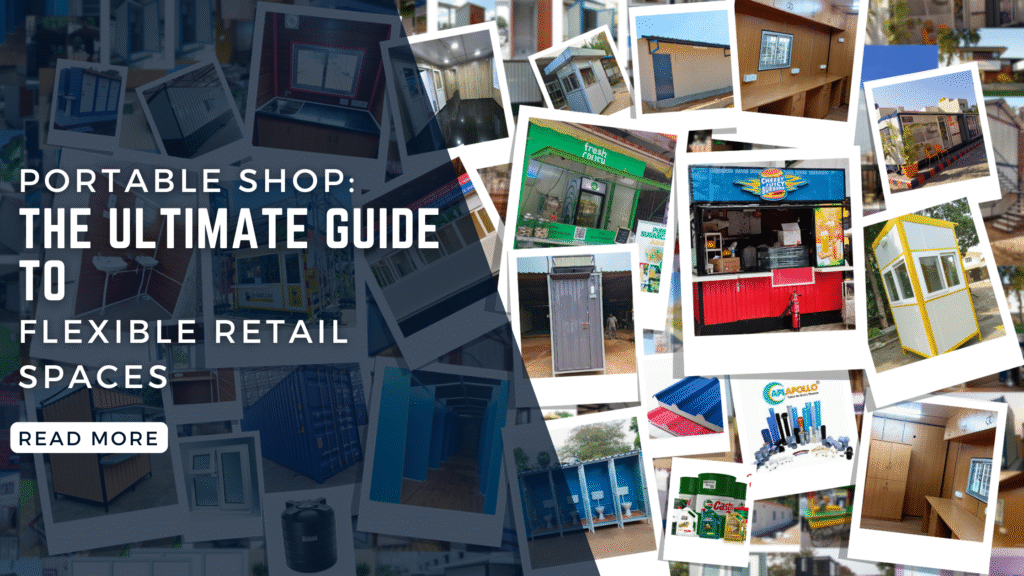
In today’s fast-changing retail environment, flexibility is the key to success. Whether you’re a small business owner, a start-up entrepreneur, or an established brand exploring new markets, portable shops offer a cost-effective, versatile, and scalable solution.
From Chennai’s bustling high streets to remote village fairs, portable shops—also called mobile retail shops, portable cabins, pop-up stores, or container shops—are transforming how entrepreneurs approach retail.
In this guide, you’ll learn everything about portable shops in India, including:
- What they are and how they work
- Benefits for different businesses
- Popular designs and layouts
- Costs, setup process, and legal aspects
- Marketing strategies to attract customers
- Voice search–friendly FAQs
Table of Contents
- What is a Portable Shop?
- Evolution of Portable Shops in India
- Benefits of Portable Shops
- Types of Portable Shops
- How to Set Up a Portable Shop in India
- Costs and Budget Planning
- Legal Requirements and Licensing
- Marketing Your Portable Shop
- Common Mistakes to Avoid
- 10+ Voice Search–Optimized FAQs
- Final Thoughts
1. What is a Portable Shop?
A portable shop is a movable retail unit designed for quick installation and easy relocation. Unlike traditional fixed stores, portable shops:
- Can move between locations
- Are fully customizable in size, layout, and branding
- Are made from durable materials like steel, wood, or shipping containers
Key Features:
- Mobility and flexibility
- Modular, space-efficient design
- Weather-resistant construction
- Quick setup (often in 30 days)
- Low maintenance cost
Alpha Enterprises Chennai specializes in designing portable shops that combine style, durability, and functionality for Indian business conditions.
2. Evolution of Portable Shops in India
The portable shop industry in India has come a long way:
- Early 2000s: Portable stalls were mostly for fairs and exhibitions.
- 2010–2015: Rise in prefabricated technology made cabins stronger and more appealing.
- 2016–2020: Popular among food brands and franchise owners.
- Post-2020: Surge in demand due to real estate costs and pandemic-driven retail flexibility.
3. Benefits of Portable Shops
Cost-Effective
No long-term leases, low operational costs.
Flexibility
Shift location based on customer demand.
Quick Launch
Be market-ready in as little as a week.
Custom Branding
Design your shop to reflect your brand identity.
Eco-Friendly
Use recycled and sustainable materials.
4. Types of Portable Shops
a. Portable Container Shops
Built from modified shipping containers, extremely durable, ideal for outdoor use.
b. Prefabricated Cabin Shops
Lightweight, modular, and can be expanded easily.
c. Kiosk-Style Shops
Compact retail solutions for malls, stations, and events.
d. Mobile Van Shops
Vehicle-based shops for food trucks or mobile sales units.
5. How to Set Up a Portable Shop in India
Step 1: Decide Your Business Model
Food, fashion, electronics, eyewear—portable shops fit many niches.
Step 2: Choose a Location
Look for high-traffic areas while complying with zoning laws.
Step 3: Design Your Shop
Alpha Enterprises Chennai offers size, layout, and theme customization.
Step 4: Get Permits
Trade license, GST registration, and other local approvals.
Step 5: Install Utilities
Electricity, lighting, ventilation, and optional AC.
Step 6: Launch & Market
Plan a grand opening with offers and social media buzz.
6. Costs and Budget Planning
| Type of Portable Shop | Approx. Cost in India (₹) | Setup Time |
| Small kiosk (6×6 ft) | 60,000–1,20,000 | 5–7 days |
| Medium cabin (10×10 ft) | 1,50,000–3,00,000 | 7–10 days |
| Container shop (20 ft) | 3,50,000–7,00,000 | 10–15 days |
Prices vary based on materials, customizations, and location.
7. Legal Requirements in India
- Trade License – Municipality-issued
- GST Registration – Based on turnover thresholds
- FSSAI License – For food-related businesses
- Fire Safety Clearance – If applicable
- Electricity Approvals – Local utility boards
8. Marketing Your Portable Shop
Use Google My Business – Helps local customers find you.
Leverage Social Media – Share shop location updates and offers.
Run Local Google & Meta Ads – Target nearby customers.
Offer Seasonal Promotions – Encourage repeat visits.
9. Common Mistakes to Avoid
- Setting up in low-footfall areas
- Ignoring permits and getting fined
- Poor shop design leading to low sales
- Not having weatherproofing in rainy areas
10. FAQs
Q1: What is the price of a portable shop in Chennai?
In Chennai, portable shops can cost between ₹60,000 and ₹7,00,000 depending on size and features.
Q2: Can portable shops be air-conditioned?
Yes, Alpha Enterprises Chennai offers AC installation for comfort.
Q3: How fast can I get a portable shop ready?
Typically within 15 – 30 days.
Q4: Are portable shops durable in monsoons?
Yes, when made with high-grade steel and waterproofing.
Q5: Do I need GST registration for a portable shop?
Yes, if you exceed the turnover limit set by GST laws.
11. Final Thoughts
Portable shops are redefining retail in India by offering mobility, affordability, and style. With the right location, legal compliance, and marketing strategy, your business can see rapid growth.
Alpha Enterprises Chennai specializes in portable shops, prefabricated cabins, and retail containers designed for Indian business needs.
